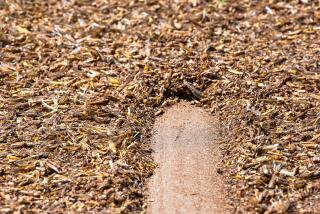Honeybee decline linked to disease, parasites, genetics, report says
- Share via
A new federal report has found that the nation’s honeybee decline, which threatens up to $30 billion worth of agriculture production, is being caused by several factors, including disease, parasites and poor genetics.
After colony collapse disorder began spreading in 2006, federal officials convened a group of researchers to study the phenomenon. Thursday’s report by the Department of Agriculture and the Environmental Protection Agency found several causes for the honeybee decline.
Rapid honeybee declines threaten crops that require pollination. California tree nut growers are particularly concerned as the drop in the pollinating insects endangers the almond crop, one of the most valuable commodities in the Golden State.
Quiz: How much do you know about California’s economy?
“There is an important link between the health of American agriculture and the health of our honeybees for our country’s long-term agricultural productivity,” said Deputy Agriculture Secretary Kathleen Merrigan.
The scientists found that the biggest threat to honeybees is the Varroa mite. The parasite has developed a resistance to chemicals that beekeepers have used in the past use to control the mite in hives.
The honeybee population also needs increased genetic diversity, the report said, which would help bees improve their ability to keep their body temperature steady in their environments.
Poor nutrition is another factor contributing to the insects’ decline. Poor forage options makes bees susceptible to disease and parasites, the report said.
Colony collapse disorder is not only affecting the U.S. In Europe, officials have banned the use of three widely used pesticides for two years in an effort to reverse the decline there.
The scientific report will form the basis of federal action to address the problem in this country.
The USDA said the country’s food supply faces pressure as an estimated one-third of all food and beverages are made possible by pollination, mainly by honeybees.
ALSO:
California Pizza Kitchen, DiGiorno pizzas recalled
Dairies in California consider incentives for moving out of state
Should schools and prisons have to buy California ag products?
ricardo.lopez@latimes.com
More to Read
Inside the business of entertainment
The Wide Shot brings you news, analysis and insights on everything from streaming wars to production — and what it all means for the future.
You may occasionally receive promotional content from the Los Angeles Times.











